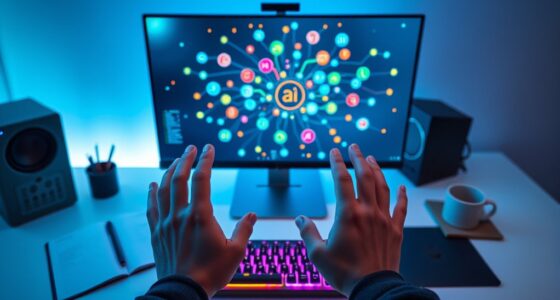Studies show that AI tools can actually slow down experienced developers like you by increasing debugging and troubleshooting efforts. You might find that integrating these tools disrupts your workflow and demands extra time for verification and adjustments. Mastering new AI systems also has a learning curve, which can temporarily decrease your productivity. If you keep exploring, you’ll discover ways to navigate these challenges and make AI work better for your development process.
Key Takeaways
- AI tools may increase troubleshooting and workflow disruptions, reducing efficiency for experienced developers.
- Manual review and adjustments of AI-generated code negate time-saving benefits.
- Integration challenges can cause friction with established developer workflows and standards.
- Learning and mastering AI tools initially slow productivity, with potential decreases in efficiency.
- Debugging AI-related issues adds complexity, making automation less beneficial for skilled developers.

Recent research reveals that AI tools, instead of boosting productivity, can actually slow down experienced developers. While many assume that integrating AI into your workflow would streamline tasks and enhance developer efficiency, the reality appears more nuanced. When it comes to AI integration, seasoned programmers often find themselves spending more time troubleshooting, adapting, and managing these tools than actually writing code. This shift can erode the very efficiency AI was supposed to improve, especially since experienced developers tend to have well-established workflows that don’t always align smoothly with new AI systems.
AI tools may slow experienced developers by increasing troubleshooting and workflow disruptions.
You might expect that AI-driven code suggestions, bug detection, or automated testing would free up your time, but they can sometimes introduce friction. For example, AI tools may generate code snippets that require extensive review or manual adjustments, counteracting any time saved. Instead of seamlessly accelerating your development process, these tools can interrupt your focus, forcing you to switch contexts or spend extra minutes deciphering AI suggestions. This disruption hampers your flow and reduces overall developer efficiency, making you less productive than before.
Moreover, experienced developers often have a deep understanding of their projects and prefer manual control over code quality and architecture. When AI integration introduces auto-generated code or fixes, you might find yourself spending additional effort verifying correctness, ensuring compatibility, or rewriting AI-produced code to match your standards. This process can negate the perceived benefits of automation, especially if the AI’s suggestions aren’t perfectly aligned with your project’s requirements. Instead of speeding things up, it can lead to a cycle of constant review and correction, ultimately slowing your progress.
Another factor is the learning curve involved in mastering new AI tools. As an experienced developer, you’re likely familiar with a variety of programming languages and frameworks, but AI tools often come with their own interfaces and quirks. Investing time to understand how these tools function, interpret their outputs, and troubleshoot their limitations can detract from your core development tasks. Over time, this learning curve diminishes your productivity, making AI integration less of an asset and more of a distraction.
Additionally, the inherent complexity of AI systems can sometimes introduce unexpected bugs or behaviors that require extensive debugging, which can be especially frustrating for experienced developers who value predictability and control. As a result, the trustworthiness of these tools becomes a significant concern, influencing whether they ultimately assist or hinder your workflow.
In the end, while AI tools have the potential to enhance developer efficiency in theory, their actual impact on experienced developers can be contrary. If you’re not cautious, AI integration might slow you down by adding layers of complexity, requiring extra validation, and disrupting your established workflows. For seasoned programmers, the key is to evaluate whether these tools genuinely complement their skills or merely introduce unnecessary obstacles to their productivity.
Frequently Asked Questions
Do AI Tools Benefit Beginner Developers More Than Experienced Ones?
You might find that AI tools benefit beginner developers more because they help shorten the learning curve and provide immediate guidance. However, for experienced developers, these tools can sometimes cause skill erosion or slow you down if you rely too much on automation. While AI can boost productivity early on, overdependence might hinder the growth of deep skills needed for complex problem-solving.
How Do AI Tools Impact Developer Creativity and Problem-Solving Skills?
AI tools are like a double-edged sword, impacting your creativity and problem-solving skills. They can lead to creative stagnation if you rely too heavily, making you less likely to explore innovative solutions. Over time, this might cause a problem-solving decline, as your skills become dulled rather than sharpened. To stay sharp, you need to balance AI assistance with your own ingenuity, ensuring you continue to grow rather than plateau.
Are There Specific Programming Languages Affected More by AI Assistance?
You might find that some programming languages face more AI compatibility issues and language-specific challenges. Languages with complex syntax or less AI support, like older or niche ones, can be more affected. AI tools often work best with popular, well-documented languages like Python or JavaScript, but struggle with languages requiring nuanced understanding. This means your productivity could slow down if you rely heavily on AI assistance for less mainstream languages.
What Training Methods Can Help Developers Adapt to Ai-Enhanced Workflows?
Embrace change as an opportunity to grow. You can adapt to AI-enhanced workflows through hands-on training, where you actively practice new tools and techniques. Peer mentoring also plays a crucial role, allowing you to learn from colleagues’ experiences and share insights. Together, these methods help you stay agile, boost confidence, and turn AI integration into a valuable skill, ensuring you remain a valuable contributor in evolving development environments.
How Do AI Tools Influence Team Collaboration and Communication?
AI tools can enhance team collaboration and communication by streamlining remote collaboration, making it easier to share ideas and track progress. However, they may also introduce communication barriers if team members struggle with new interfaces or rely too heavily on automated responses. To maximize benefits, you should encourage clear, direct communication and provide training to assure everyone adapts smoothly, fostering a more connected, efficient team.
Conclusion
So, surprising as it sounds, savvy software developers might find AI tools actually impede their progress rather than improve it. This study shows that seasoned coders can stumble when relying too heavily on AI assistance, slowing down their speed and stifling their sharp skills. Stay sharp, and don’t let automation undermine your expertise. Keep coding consciously, and remember—sometimes, traditional techniques trump tech tricks. Ultimately, balance beats blind reliance, ensuring your proficiency stays powerful and poised.









